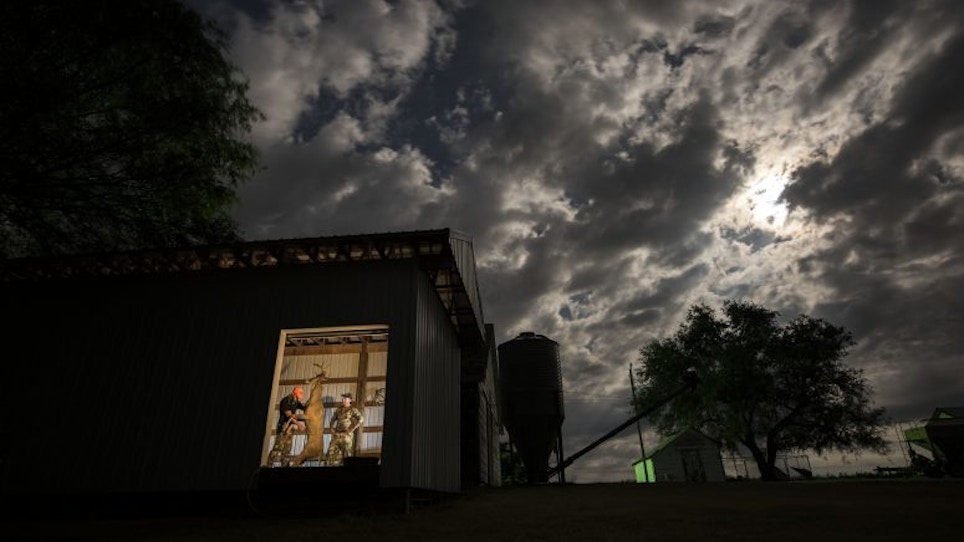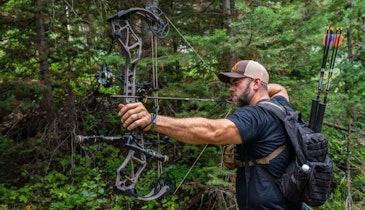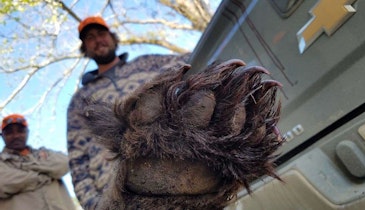“Honey, I can’t believe they’re paying me to do this.”
That’s what Dan Perez whispered to his wife as he walked the second property he handled for his new employer, Agriland. He had come across a creek and noticed tracks going up the bank. Tracks with water in them.
“I thought, ‘Man, that’s fresh. That deer just came across here,’” Perez remembered. “So I climbed up the bank and looked across, and there were three bucks. One of them looked up. He was huge.”
Unable to contain his enthusiasm, he went back down the creek and called home, keeping his voice down so as not to spook the deer.
And while many of us have felt that way in the early days and weeks at a new job, for Perez, that excitement hasn’t abated at all since that moment beside the creek. What’s more, he’s used that passion to help build a highly successful real estate company that specializes in recreational land – although, if you stick around the Whitetail Properties headquarters for any amount of time, you’ll find that the company’s real specialty is, as its tagline says, growing dreams.
I was fortunate to have the opportunity to visit Whitetail Properties, located in Pittsfield, Illinois, last December to sit down with Perez and the rest of the Whitetail Properties team. I was there to find out what’s behind the company’s success. While 2016 was a fairly flat (or worse) year for many companies in the archery industry, Whitetail Properties continues its remarkable growth. At the time of my visit, the company had roughly 160 agents working in 24 states – and that number keeps growing.
It didn’t take long for me to discover what drives the company’s success. There’s the focus on customer service, the smart marketing and branding efforts, the efficient use of people and resources. But at its heart, Whitetail Properties is all about the people that work there. This is an organization that seeks out and hires top-quality people that share Perez’s love of the outdoors, of hunting, of whitetails and, most importantly, of land.
“Divine Intervention”
I’ve heard that working a job you love keeps you young, and that’s certainly the case with Perez, who possesses that ageless quality of old movie cowboys. He has a long history in the archery industry, having worked at PSE for 18 years before joining Agriland. Although Perez didn’t have experience selling recreational real estate, his passion for his new venture more than made up for what he didn’t know.
“I love shooting bows, and I love hunting,” he explained. “But I was in that business because I love land. I love being out in it. I love cold, crisp mornings. I love sunrises and sunsets. I love the smell of dirt. I love every aspect of land.”
With his knowledge of hunting, his network of contacts in the hunting industry and a relentless drive to learn what he didn’t know, Perez was soon doing extremely well at Agriland.
And then, in a twist that Perez describes as “almost divine intervention,” Perez got a phone call from a local investor and small business owner named Pete Alfano. Alfano bought properties, did some work to them and then resold them at a profit. He also owned, with a partner named Paul Sawyer, a business called Knock Em Down Productions, and he and Sawyer wanted to speak with Perez about creating a real estate business that produced a television show to leverage selling land.
At the same time, Perez was also discussing the possibility of incorporating television into selling properties with three other land investors, Rob Saunders, Stacy Ward and Allen Blevins. Perez had some experience with video through PSE and Drury Outdoors, and he, Saunders, Ward and Blevins were interested in utilizing the medium to promote land ownership.
“So, Rob, Stacy, Allen, Pete, Paul and I met and discussed starting a business that, initially was designed to promote other real estate businesses, not necessarily our own,” he explained. The six men later brought in Wes McConnell and Joe Sewell and eventually purchased back Stacy Ward and Allen Blevins’ ownership interest. Now they were back to six owners.
“We all fit very well,” Perez said. “We’re all passionate about the outdoors. We’re all passionate about hunting. But we bring different values. I bring the real estate value, as well as my sphere of influence, a lot of relationships from the outdoor industry, a lot of sponsors, buyers and agents. Rob understands land and he’s a very good CPA and corporate businessman. Pete is a land investor, a property improvement specialist and businessman. Paul brings the production side of the business as well as his communication and organizational skills. Joe Sewell is a land investor, banking advisor and businessman. Wes McConnell is a very good account and businessman. It worked out very well from a business standpoint and in terms of people you can work with. We meshed very well.”
It was 2006 when the six partners launched the company, which was designed to serve as a marketing arm for other real estate companies.
“And then,” Perez said, “it was 2007.”
A New Direction
Ah, 2007. Not exactly the best year to be in the real estate market, especially as a fledgling company that depended on other real estate companies for business.
“We had quite a few people that we were marketing for, and a lot of them stopped paying us,” Perez said.
That might have been the end of the young company. But the partners decided to go in a new direction.
“We know this business better than anyone,” Perez said. “We know the land business. So we said, ‘Why don’t we forget marketing them and market ourselves?’ And that’s what we did.”
That was the start of Whitetail Properties. The company utilizes its television show, Whitetail Properties TV on The Sportsmen Channel, to help promote its listings, the rewards of owning land and showcase great hunts as a result of QDM to millions of people.
“The television show is a great marketing tool for us because it gives us the opportunity to highlight our knowledge and skillsets to the public,” stated Perez. It’s very valuable for potential clients to see why we are the best at what we do as well as be entertained with exciting hunts along the way.”
“One of our biggest branding tools is our television show,” said Marketing Director Alex Gyllstrom. “At the end of the day, we always try to bring it back to the land. We love dirt. But we’re all really passionate whitetail hunters. And being able to produce a television show that showcases not only our love for the outdoors and hunting but also the land is a blessing for us. And to be able to work with our incredible sponsors. We take a lot of pride in being able to work with top-tier brands in the hunting industry specifically. We couldn’t do it without the viewership and the sponsors seeing the value.”

Measured Growth
Over the past 10 years, Whitetail Properties has become a dominant force in the recreational land market. And no one envisions the company slowing down any time soon.
“We’re in 24 states,” Perez said. “In 2017 the plan is to expand into Florida, New Mexico and South Dakota. Every year, we grow. We want to be a household name that will be in business long after we’re all gone. We want Whitetail Properties to be around a long time. We’re committed to it.”
To that end, Perez refuses to grow complacent.
“I have a saying,” he said. “It’s ‘fat, dumb and happy.’ A lot of times, when people are doing very well, when their business is where they wanted it to be, they become fat, dumb and happy. They no longer run it as prudently as they did to get the business off the ground. They no longer pay attention to details. And they let a lot of revenue slip through the cracks. I always say, ‘If you’re too fat to bend over and pick up a penny, then there’s no place here for you.’ And I don’t mean it literally, of course. When I say fat, I mean too wealthy, too happy in your situation. A lot of times when things are going well, businesses get sloppy. And the first time there’s a dip in the economy, those guys are swimming. And a lot of them fail.”
Perez, who serves as the CEO of Whitetail Properties, keeps a close eye on the bottom line.
“I think our 2016 gross sales are going to end up a little over $735 million. This doesn’t come fast. You can’t say when you’re doing $700 million in sales that next year you’re going to do a billion. You don’t jump that big. But I project we’ll be doing over a billion in gross sales in 2019. We actually have a weekly goal, and we measure it. Every week Nikki Kindle, our accountant, gives us our numbers. She’ll also give us last year’s numbers for that same week. We won’t be one of those companies that tell you where we plan on being in a year or two years but never know where we are right now or where we were last year. We stay on top of that all the time.”
The Right People
During my visit, I interviewed a dozen members of the Whitetail Properties team, asking each one what he or she believed was behind the company’s success. Every single person gave the same answer: the people.
That’s no accident. Perez explained the exacting criteria the company uses to select employees and agents, as well as the support and knowledge they provide those employees.
“There are three things that are most important,” he said. “Number one is that they’re honorable people. Number two is that they’re passionate about the land and the outdoors. And number three is that they’re professional. They can conduct themselves professionally, understand the etiquette of doing business, they don’t talk down to anyone and they’re not intimidated by anyone above them. You see, we might have someone who’s been working their whole life, and their dream is to own 25 acres. On the flip side, we might be talking to a multibillionaire many times over who wants to buy half of Illinois. So it’s extremely important that they can talk to anyone.
“We have 160 agents in 24 states. It’s a bloodline. The DNA is the same. If you read the profiles on our website it’s plain to see, every agent is cut from the same cloth. They’re passionate, they’re honorable, they’re professional. Every one of them. And one of the reasons that I love the outdoor industry is that the manufacturers who hire rep groups or reps demand excellence. I come from that industry, and we employ several others that started there. They all do extremely well. But that’s just the beginning. After we find and hire the right genetics, we pour into them. The main initiative of every single staff member we employ is to do everything within their field of expertise to help every agent be successful. We teach, train, mentor, coach and support our agents like no other real estate brokerage.”
A positive drawing factor to Whitetail Properties as a company is its business model. “Our Land Specialists that work hard and do it right enjoy a very lucrative career,” explained Perez. “In fact, it’s a job where you can make literally as much money as you want. They get to make their own hours, work from home offices and be outside every day. It’s hard work to be successful, but it’s incredibly enjoyable work. We find that the ones who truly buy into what we are doing, are happy to work hard because they truly love what they are doing.”

The Right Tools
Hiring the right people is difficult enough. But even the best people will fail if they’re not given the right tools and the right support. That’s another area in which Whitetail Properties excels.
Unlike many other real estate companies, Whitetail Properties doesn’t necessarily look to hire people with previous real estate experience.
In most real estate companies, if you have a license and a pulse, you’re hired,” said CFO Joe Candella. “Ninety-five percent of our new hires don’t have real estate experience. That way we can teach them the Whitetail Properties way.”
According to National Sales Manager Kirk Gilbert, the Whitetail Properties way involves a great deal of education, experience and special certification.
“The WPCLS is a land certification that only we have,” explained Gilbert, an Arkansas native who, in his own words, basically grew up in his family’s real estate business. “This requires them to work for us for three years. They have to become an accredited land consultant (ALC) through the Realtors’ Institute. They have to have sold so much in gross sales and have done so many transactions. They have to have a minimum of 80 percent customer satisfaction – we send surveys out on every transaction that we do. We also have a partnership with QDMA where we require the Quality Deer Management Stewardship Program I and II.”
This sounds like a lot and it is, but Whitetail Properties does of this to ensure that the company’s clients get the absolute best service possible.

“Ten years ago, the term ‘land specialists’ was pretty rare, but now everybody is a ‘land specialist,’” Gilbert added. “So we wanted to make it more special, more elite. The ALC just in itself has 104 hours of classroom hours that you have to do. Classes like 1031 Land Exchange, Tax Exchange, Timberland. By the time you’re done with that and have three years and 25 transactions, you really know the business.”
And while many real estate agents are operating out on their own, the Land Specialists at Whitetail Properties always have experienced people available to support them.
“I enjoy working with the agents, helping them work through problems – title problems, commission problems, contract issues,” Gilbert said. “When the going gets tough, that’s when we really earn our money. We’ve been through these situations before and we know the steps to take. And that means being around for agents even on the weekends. It doesn’t happen on Monday at 1. It happens on Sunday at 9 o’clock at night. That’s when business happens and that’s when we are there, ready to help.”
Bringing Them In
Whitetail Properties Land Specialists also enjoy the support of a robust marketing department that drives in both buyers and sellers.
Marketing Specialist Wes Hartling is responsible for helping the agents develop marketing strategies to find sellers.
“Over the years we’ve developed very detailed strategies on a local level,” he said. “We utilize direct mailings, newspapers, shoppers, billboards, radio advertisements, anything we can really do. We have a really great in-house marketing and production team that do pretty much anything. Every plan is different. On a local level you might have a newer agent who spends thousands in marketing and a veteran agent who’s been with the company for eight or nine years who does a much broader plan and spends tens of thousands of dollars on local advertisements.
“My primary focus is to get these agents as many listings as possible. So I have to think about who our market is, and typically a seller is going to be the older generation. If it’s cool to them, we’re going to do it. That’s who we target.”
Alex Gyllstrom is responsible for overseeing the marketing department as a whole and specifically attracting potential consumers. A big part of that is the company’s website, which serves as the main hub for Whitetail Properties’ marketing efforts.
“WhitetailProperties.com is your resource for all things land,” explained Gyllstrom. “Whether you’re looking at how we showcase our properties or finding all the information you can on a certain region or area, it’s on our website.”
The website isn’t just a collection of listings. Whitetail Properties also offers unique, original content to further drive traffic and help educate visitors on a variety of topics.
“One way we’re trying to supply great content is our LandBeat video series,” said Gyllstrom. “We’ve done everything from how to trap predators effectively to help your deer herd to how your property can generate additional income. It’s still in its early stages, but growing that over time has been really exciting and provides great value for not only current and potential clients, but anyone that is passionate about the outdoors.”
In addition, Whitetail Properties takes full advantage of social media, connecting and interacting with past, present and future clients. Gyllstrom said one of his favorite parts of his job was being able to share in client success stories.
“We’re in our tenth year of business, and we have a healthy stable of past clients,” he said. “That’s something we’re very proud of – the number of people we’ve been able to do business with. And now we are in a position where we can speak from experience and get to help tell some of our clients’ success stories. People who invested in land and have had four, five, six, seven years of time, money and effort they’ve put into that land, are now reaping the benefit of that hard work. That’s the payoff for us, seeing other people be successful and achieve their dreams is what we’re all passionate about.”
Finally, the company produces its own biannual magazine, American Land, which offers a feature on land in each issue, as well as some of the company’s top listings. And now American Land is offered as a digital publication, allowing for even greater distribution – and immediate access to further Land Specialist and property information on each listing, thanks to clickable links.
“As proud as we are of the printed magazine, the digital version is a real game changer. It allows us to send it to many more people,” Gyllstrom said. “Instead of seeing the printed magazine and having to remember a property to look up later, with one click of the mouse, they can find everything they need to know in seconds. Every single Land Specialists email is available by a clickable link.”
Finding the Right Fit
The people who join Whitetail Properties really know their stuff. That fact was reinforced as I spoke with team member after team member. They all shared Perez’s passion for the land, but they weren’t riding that passion alone. These are true experts in their respective fields, and they take their roles seriously.
Finding the right people is so important for the company that three members of the team – Candella, Evans and HR Specialist Kelly Johnson – spend one day a week on the hiring process.

First, Johnson sorts through resumes, contacting candidates that might fit in with the team.
“We like for individuals to have five years of professional experience,” said Johnson. “Three years of sales experience. Of course, they have to know about the outdoors. Not just hunting – we like to find somebody well-rounded. Agriculture, investment, that type of thing. They have to know the different uses of land. Not all of them, but when they show a person a property, they should to be able to talk about it how that persons needs it to be talked about or to show them what it could be.
“And of course, they have to be ethical and have high integrity.”
Then, Johnson, Candella and Evans spend their Tuesdays reviewing candidates and doing second phone interviews.
“After that, we’ll bring them in for an in-person interview that might last two to three hours. That one will be with the three of us and Dan,” explained Candella. “Then they’ll go through our orientation and get their licenses, and they’ll become a land specialist for us. I would say out of all the companies I’ve worked for, this is the only company I’ve worked for that spends all that time looking for people and trying to get the right people.”
The result is glowing testimonials about the land specialists Whitetail Properties employs. The company also enjoys remarkably low turnover.
“We don’t lose many people,” Candella said. “I read an article recently from the National Association of Realtors that said within five years, 85 percent of people who got their license would not be in real estate any longer. We pride ourselves on being very good at picking the right people, and those people are usually very successful.”
Top-Level Partnerships
Whitetail Properties’ clients aren’t the only people who appreciate what the company is doing. A number of notable brands have noticed as well, and Whitetail Properties has established some partnerships with complementary companies.
“We want to associate with top-quality brands,” Gyllstrom explained. “Not only brands that we find value in, but brands that find value in us and our business model. A really good example is John Deere. We do a lot with John Deere. We’re a part of their Green Fleet program and can offer our clients discounts on John Deere machinery. No other real estate company has that ability. John Deere is the premier machinery brand in the world to work the land, we want to work with the best and we want to offer the best to our clients.
“A relationship that was recently solidified is Morton Buildings. They’re the top brand for farm, storage and residential buildings, they quickly saw the value in what we do, the quality of our brand and eagerly agreed to work with us. What better way to add value to our clients than provide them with special priced options for a cabin or equipment storage building? We were excited to get to work with them, and it’s something else that’s unique to us as a real estate company.
“Any time we can synergize with these top-level brands, it helps the client, which is always the end goal. Doing business with us gives them access to so much more. It’s not just buying or selling a piece of property. At the end of the day, we want to make sure it’s the best possible experience for them.”
Customer Service
The weekend before my visit to Whitetail Properties, a significant ice storm hit the area, and the company’s front sidewalk was covered in a sheet of ice. An hour before I was supposed to arrive at Whitetail Properties, Marketing Director Alex Gyllstrom sent me a text. “Please let me know when you get here,” it read. “I’m going to have you come in a different door.” When I called him, he directed me to a parking spot they’d saved for me on the side of the building, allowing me to enter through a much easier-to-navigate side entrance.
Once inside, I noticed a board in the reception area. “Welcome to Whitetail Properties,” it read, with space underneath for the names of guests. On that day, my name was on the sign.
Those are small things, sure. But they demonstrate that Whitetail Properties has made a habit out of paying attention to the details that matter to people.
Delivering exceptional customer service is a vital component of the Whitetail Properties philosophy. Much of the company’s business is repeat business, a testament to the company’s commitment to building relationships and creating exceptional experiences.
“For us, business is not about making the sale at all costs,” explained Perez. “The most important thing to us is to serve the customer to the best of our ability, and that’s always been what we’ve done. We still concede that the customer is always right, regardless of what that might cost us.
“I had a client once that put up a large earnest deposit. He had second thoughts a week before closing. The seller said, ‘I’m keeping his earnest deposit. Everything I’ve agreed to in writing I’ve stood behind, and you have voided the contract.’ It was a pretty good chunk of money, and the buyer got nothing in return. Then the seller said to me, ‘I think you should sue him for your commission.’
“I said, ‘No, we’re not going to sue anybody.’ The first thing I did was tell that buyer I sympathized with his situation. I understood if he didn’t have peace in his heart, that was meaningful and important to his family and him at that time.
“I was still worried that he would have resentment because I was part of the transaction. But I stayed in touch with him. That’s very important to us. When we do business with someone, whether our time together consummates in a sale or not, we stay in touch with them. Eight years later, that same buyer who forfeited his earnest deposit, bought a giant farm from us. So often, people are so bent on being right they hurt themselves in the big picture. So for us, it’s never been about the sale. It’s about the customer. And that I believe more than anything has built our business.”
Growing Dreams
The emphasis on customer service was something I got from everyone I interviewed. While they’re immersed daily in the legalities and technicalities of buying and selling land, they never forget that for the customer, buying a piece of property is often the realization of a lifelong dream.
When Gyllstrom, formerly of ScentLok, first contemplated making the transition from manufacturing to real estate, he wondered how he would be able to do what he loved best – helping hunters in the field. He thought about it for some time before, as he told me, “it clicked.”
“What’s the one thing hunters need to be successful?” he said. “You need land. That’s the root of it all. And if I can help hunters accomplish their dreams of owning property or managing property, if I can accomplish that by connecting them to the land itself, that’s the best way to help hunters.”
This was a common theme during my conversations with the team.

“It’s cool to hear someone being so excited about buying 40 acres for hunting,” said Candella. “Maybe it’s just to have a family retreat. Maybe it’s to teach their sons or daughters how to hunt on a small tract and hand down what their dad taught them. The family side of it is really cool. Maybe 120 acres is what they want, and 40 is what they can afford. But they can dream about the next step. Maybe the next step is 80 acres. Maybe it’s a plot in Iowa instead of Illinois. People continue to dream.”
“It’s very rewarding,” Gilbert agreed. “The best part is when, six months later, they send you a picture of the big buck that their son killed on [their new property]. That relationship never really stops. I’ve built relationships that will last me a lifetime.”
The Joy of Land Ownership
Every conversation I had at Whitetail Properties came back to one thing: the land. Perez was quick to point out that owning land offers numerous benefits, both tangible and intangible.
“Here’s what’s cool about our business,” he explained. “Manufacturers sell products that have a promise of the purchaser being more successful in the field. But there’s no product that a hunter can purchase that will increase their odds of being successful consistently more than owning land. Because with the land, you can improve the habitat and you can improve the food. You can attract, hold, grow and harvest big deer. You have control over it.
“We have guys on our staff that kill 200-inch animals on a pretty regular basis. Most hunters will never see a 200-inch animal in their entire lives. Once in a great while a hunter may go somewhere and the stars align, and they kill a 200-inch animal. That’s a great stroke of luck to be in the right place at the right time, but the hunters who harvest bucks exceeding 200 inches most often own the land.”
Big deer aren’t the only reward a land owner can expect.

“Over any ten-year period, the value of that land is always worth much more than when you started,” Perez said. “It’s not manufactured in China or held in a warehouse in Taiwan. It’s made by God, and He’s not making any more. But at the same time, populations keep growing and overflowing into the country, and as a result the people are more dependent on corn. They’re more dependent on beans. They’re more dependent on recreation and minerals. They’re more dependent on all these things that the land produces. If you’ve ever thought of the perfect scenario of diminishing supply and increasing demand, it’s land.”
The company saw the stability of land as an investment during the last recession. Managing Broker Jeff Evans noted that investors were initially apprehensive as the economy stumbled.
“It was a trying time for us,” he said. “Maybe not to the extent of the residential real estate world, but we definitely felt it. We saw people who had invested a lot of money in recreational land pull back a little. People kept saying the bottom was going to fall out of it.
“But we saw land hold its own way more than homes did. Coming out of 2010 and 2011, people saw that the land market didn’t collapse as badly as housing did, and then we saw things come back. It came back very quickly, and it’s continued to do so. They can print more money, they can build more houses, but they can’t make more land. There may be ups and downs, but across the board it’s a stable investment. As the world population grows, you’re going to see it become more valuable.”
Perez also pointed out that, unlike stocks, land ownership offers people the opportunity to increase the value of their investment.
“If you buy a paper investment, there’s nothing that you can personally do to increase the value of that investment,” he explained. “But you buy a piece of land, you can make some changes yourself – whether it’s adding food plots or improving a road – and not even wait to change the value of that property.
“And while you’re doing those things, a lot of it is tax deductible, so you’re getting an advantage at both ends. I look for a return. I borrowed money for a farm I purchased at 4.25 percent. A 20-year mortgage at 4.25. The land itself provides a 6 percent return – I cash-rent it to a farmer – so I’m making money on the difference. Then, on top of that, the land itself is appreciating in value, and it’s appreciating much more aggressively though the improvements I’ve made to the farm. I call this forced inflation. The best part is, while all of this is happening, I’m enjoying the property. I’m hunting. I’m fishing. I’m going out with the family. It’s incredible.”
For Evans, the fact that land can be enjoyed while serving as an investment is what sets it apart from other investments.
“You can put money in the stock market,” he said. “You can put money in a mutual fund. I can’t really go enjoy that. I can’t take my kids four-wheeling on it. I can’t hunt on it. So it’s a way to put your money someplace safe that you can enjoy while you have it.”
The Future
Whitetail Properties shows no sign of slowing down any time soon.
“We’ll continue to expand,” said Candella. “We’ll probably go further west. I can see some more strategic partnerships with complementary companies. More states, obviously. Right now we have 160 agents. The company would be able to handle about 250 without any trouble whatsoever.”
And the company will continue to develop into all things land.
“As we’ve grown and broadened our stroke, the diversification has happened organically,” said Gyllstrom. “Because we specialize in land – and not just hunting property – we’ve become experts in farming. We’ve become experts in ranching. We’ve become experts in timber and timber value. Even though our brand is centered around whitetails, being land specialists is truly what we hang our hat on.”
Through it all, Perez has not lost focus on what matters most – the land, and the dreams that land helps people realize. He still gets excited when he talks about the land and all it offers.
“I still think back on my first days as a land specialist and I think about where we are today. I still find myself thinking ‘I can’t believe we are getting paid to do this.’”
Why Whitetail Properties?
When I asked Perez about the company’s competition, he explained that their greatest competition is actually the independent small-town realtors who’ve been operating in an area for decades.
“The advantage they have is that they have a large client base,” he explained. “But for most of them, a small ad in the local paper is about the most they can do as far as reaching buyers. On a national level, our television show alone is in 50 million homes. We’re in all kinds of publications. We’re always doing things with organizations like QDMA. We reach a lot of people. As a result, regardless of the state that we’re in, 80 percent of the business that we do in that state comes from people from out of state. They know what they have at home, and they want a new experience.”
November Studios
Whitetail Properties’ marketing efforts get a major boost from sister company November Studios, which produces Whitetail Properties TV as well as marketing materials for Whitetail Properties.
I had a chance to sit down with Creative Director Nick Skinner, and once again, it became clear that Whitetail Properties’ emphasis on integrity and quality are equally important at November Studios.
“We’re very authentic to the brand and making sure the message is about land and land ownership,” he said. “Because that’s really the difference between us and every show out there.
“Our content stands out because of the quality. The way the story is told. Our show is as authentic as you can get when it comes to managing for whitetails. That’s who our guys are. It’s very authentic. When we’re out with one of our agents, we don’t just throw something together that’s not how he would do things.
“And of course big deer. The quality of deer that we’ve been able to harvest is very impressive. And that’s all due to land management and land ownership.
“We take pride in education. In 2013 we won Best Educational Show on The Sportsman Channel. That’s probably the best award we could ever get, in our opinion, because we want to educate the viewer on QDM and managing whitetails.”
All photos in this article provided by Whitetail Properties Real Estate.






